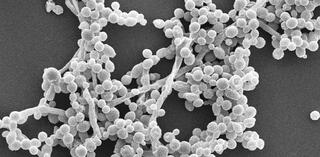Engineered Yeast

Great Lakes Bioenergy researchers have developed innovative genetic techniques to create yeast that can more efficiently convert sugar to biofuels. By improving well-known industrial yeasts as well as tapping into the diversity of wild yeasts, these researchers are improving the economics of sustainable biofuels and bioproducts.
UW–Madison senior scientist Trey Sato created a strain of “super yeast” that doubles the efficiency with which the industrial yeast Saccharomyces cerevisiae converts plant sugars to biofuel. To do this, Sato isolated specific gene mutations that allow S. cerevisiae to convert xylose, a hard-to-digest sugar, into fuel. The yeast has the potential to transform xylose from a waste product to a source of profit.
UW–Madison associate professor Chris Hittinger has developed a yeast hybridization technique that allows him to coax two different species of yeast to reproduce. The resulting hybrids combine traits of interest to the biofuels industry, including stress tolerance, sugar consumption, and biofuel yield.